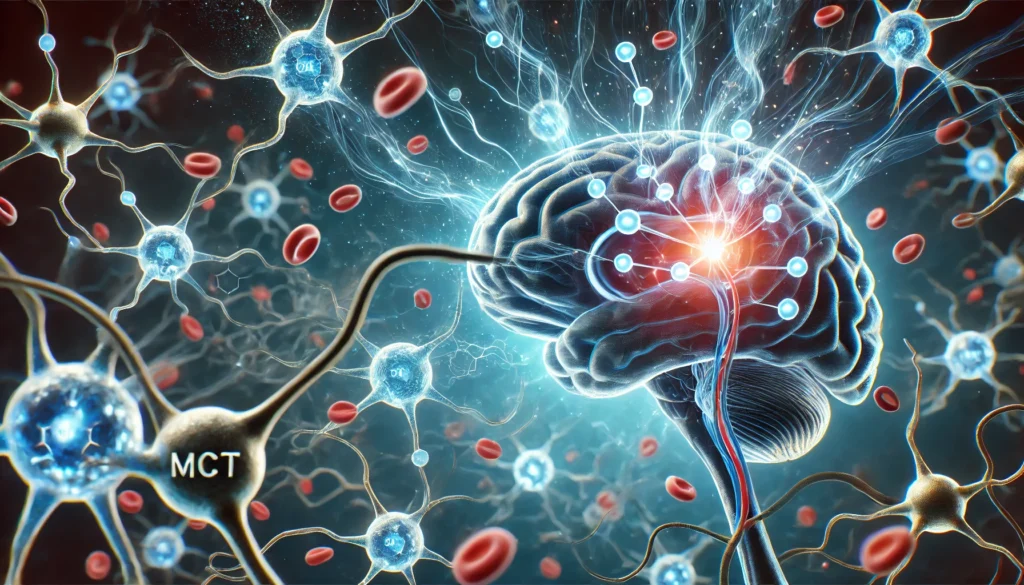Introduction
The search for effective interventions that can support cognitive health, delay dementia progression, and enhance brain function has never been more critical. As populations age and neurodegenerative conditions like Alzheimer’s disease become more prevalent, researchers and individuals alike are turning to scientifically backed dietary strategies. Among the leading candidates in this space is Medium-Chain Triglyceride (MCT) oil—a form of fat derived primarily from coconut oil and palm kernel oil, long known for its unique metabolic effects. The spotlight on MCT oil for dementia and other cognitive concerns is growing brighter, with promising data suggesting it may help fuel the brain in ways traditional diets cannot.
You may also like: The Science of Gut Repair: How to Heal Leaky Gut Syndrome Naturally with a Proven Gut Healing Diet
MCT oil has attracted scientific and public interest for its potential to serve as an alternative energy source for neurons—especially when glucose metabolism in the brain becomes impaired, as is often the case in Alzheimer’s and other forms of cognitive decline. But how much of this is supported by hard science, and what is still speculation? Can something as simple as a dietary fat really play a therapeutic or protective role in neurodegenerative disease? Moreover, emerging discussions in both research and pop science have delved into the phenomenon dubbed “MCT mind control,” suggesting MCTs might influence not only brain energy but also cognitive flexibility, mood, and perhaps even behavior.
This article takes a comprehensive, evidence-based look at the relationship between MCT oil and brain function. We’ll examine what science tells us about its biochemical mechanisms, clinical trials involving MCT oil for Alzheimer’s and memory support, and the broader implications for those experiencing mild cognitive impairment or simply seeking sharper mental performance. From the ketogenic connection to neurological energy dynamics, and from functional foods to clinical application, we’ll explore the full potential and limitations of MCT oil and the brain.

What Are MCTs and How Do They Work?
Medium-chain triglycerides are a class of dietary fats that are metabolized differently from long-chain fatty acids found in most foods. Unlike their longer counterparts, MCTs bypass the standard digestive pathway and go directly to the liver, where they are rapidly converted into ketone bodies. These ketones can serve as an alternative fuel for the brain, which is typically reliant on glucose. This alternate fuel becomes especially important in aging brains, where glucose metabolism often becomes impaired.
The most common types of MCTs include caprylic acid (C8), capric acid (C10), and lauric acid (C12). Of these, C8 is the most efficiently converted into ketones and is often the preferred component in MCT oil supplements. Ketones have been shown to cross the blood-brain barrier and support mitochondrial function within neurons, which are crucial to maintaining memory, cognition, and focus.
Because of their ability to enhance ketone availability, MCT oils are commonly used in ketogenic diets—particularly for therapeutic purposes such as epilepsy and increasingly, cognitive decline. This has led to a growing interest in using MCT oil for brain health not only among clinicians but also among biohackers and wellness enthusiasts who are exploring its cognitive benefits in both aging and healthy populations.
MCT Oil and Brain Function: The Science So Far
The hypothesis that MCT oil and brain function are interconnected stems from the idea that many neurodegenerative conditions involve a form of “brain energy gap.” In Alzheimer’s disease, for example, glucose uptake in the brain is significantly diminished, even in early stages. This has led some researchers to refer to Alzheimer’s as “type 3 diabetes”—a condition marked by insulin resistance in the brain.
Ketones derived from MCT oil offer a workaround. Studies show that when individuals consume MCT oil, the liver produces ketones that can serve as a substitute energy source for neurons. This fuel substitution has been shown to improve memory performance and overall cognitive function in certain populations.
A notable clinical trial published in Neurobiology of Aging found that subjects with mild to moderate Alzheimer’s disease experienced significant improvements in cognitive performance after consuming MCT oil, particularly those who did not carry the APOE4 gene variant, which is associated with increased Alzheimer’s risk. The study indicated that even a single dose of MCT oil could raise plasma ketone levels and lead to measurable improvements in memory within 90 minutes.
Additional research published in journals such as Current Alzheimer Research and Frontiers in Aging Neuroscience has corroborated these findings, suggesting that MCT oil for memory enhancement may offer real benefits for those in early cognitive decline. Researchers are now exploring whether MCT oil for Alzheimer’s could be part of an integrative treatment protocol that includes lifestyle interventions like diet, exercise, and cognitive training.

MCT Oil for Dementia: Therapeutic Promise or Just Hype?
Dementia is an umbrella term that encompasses a range of conditions characterized by memory loss, cognitive decline, and behavioral changes. While Alzheimer’s disease is the most common form, others include vascular dementia, Lewy body dementia, and frontotemporal dementia. Although the exact causes and mechanisms of these diseases vary, one common thread is neuronal damage, energy deficits, and synaptic dysfunction.
So where does MCT oil for dementia fit into this picture? Research suggests that ketone bodies produced from MCT oil can enhance mitochondrial function, reduce oxidative stress, and improve synaptic signaling—all of which are critical to brain function. In the context of Alzheimer’s and other dementias, where the brain’s ability to utilize glucose is compromised, ketones can serve as a lifeline for starving neurons.
It is important to temper this enthusiasm with scientific realism. While many studies show promising short-term cognitive improvements from MCT supplementation, long-term effects remain unclear. Few clinical trials extend beyond 90 days, and many include small sample sizes or fail to account for lifestyle variables. Still, the consistent findings of improved memory, attention, and processing speed in response to MCT consumption are enough to warrant further investigation.
Additionally, the “MCT mind control” narrative, while popular in media and among biohackers, should not be misinterpreted. There is no scientific evidence suggesting MCT oil allows for behavioral or psychological manipulation. Rather, it refers to the idea that enhancing brain energy through MCT supplementation may result in greater focus, mood stability, and decision-making ability—especially in individuals with metabolic or neurological dysfunction.
Exploring the Ketogenic Connection
The use of MCT oil for brain health is closely linked to the ketogenic diet, which involves drastically reducing carbohydrate intake and increasing fat consumption to encourage the production of ketone bodies. Ketosis has been used therapeutically since the 1920s for epilepsy and more recently for metabolic and neurodegenerative diseases.
When people follow a strict ketogenic diet, the body shifts from burning glucose to burning fat as its primary energy source. This leads to increased levels of circulating ketones like beta-hydroxybutyrate, which can be used by neurons as fuel. MCT oil enhances this process because it produces ketones more efficiently than dietary fat alone.
For individuals who struggle to maintain a ketogenic diet, adding MCT oil to a regular diet can offer many of the same cognitive benefits without the need for full dietary adherence. This makes MCT oil an accessible and practical intervention for older adults or individuals experiencing cognitive decline who may not be able to commit to complex dietary regimens.
The ketogenic connection also raises questions about metabolic flexibility and cognitive performance in younger, healthy individuals. Preliminary studies suggest that MCT oil may improve cognitive function in healthy adults under conditions of mental stress or fatigue by supporting mitochondrial resilience and neurotransmitter balance.

MCT Oil and the Brain: Mechanisms at Play
The biological mechanisms behind MCT oil and the brain’s interaction are complex but fascinating. At the cellular level, ketones derived from MCT oil influence brain function in several ways:
They improve mitochondrial efficiency, allowing neurons to produce more energy per molecule of fuel.
They reduce oxidative stress by generating fewer free radicals than glucose metabolism.
They modulate inflammation by inhibiting pathways like NF-kB, which are often overactive in neurodegenerative diseases.
They support the synthesis of important neurotransmitters, such as GABA and glutamate, which regulate mood and cognition.
They may enhance brain-derived neurotrophic factor (BDNF), a protein essential for neurogenesis and synaptic plasticity.
All of these mechanisms contribute to the observed benefits of MCT oil for memory, attention, and overall brain health. Moreover, the fact that MCTs are able to produce rapid changes in ketone levels—often within minutes of ingestion—makes them uniquely suited for therapeutic use, especially in scenarios where quick cognitive improvements are desired.

Choosing the Best MCT Oil for Memory Loss
Not all MCT oils are created equal. For individuals interested in using MCT oil for Alzheimer’s or general memory support, selecting a high-quality product is essential. The best MCT oil for memory loss typically contains a high concentration of caprylic acid (C8), which is the most ketogenic and most effective for brain energy metabolism.
Purity and sourcing also matter. Look for MCT oils that are extracted from non-GMO coconuts using a chemical-free process. Some products also combine MCT oil with other brain-supportive nutrients like DHA, phosphatidylserine, or curcumin for synergistic benefits.
While MCT oil is generally recognized as safe, it’s important to start with a low dose (e.g., 1 teaspoon per day) and increase gradually, as some individuals may experience digestive upset. Consultation with a healthcare provider is also recommended, especially for individuals with liver conditions, gallbladder issues, or those taking medications for diabetes or epilepsy.
Integrating MCT Oil into a Brain-Healthy Lifestyle
Supplementing with MCT oil can be beneficial, but it should not be viewed as a standalone solution. Cognitive health is influenced by a constellation of factors, including sleep, stress management, diet, physical activity, and social engagement. Using MCT oil for brain health is most effective when integrated into a broader neuroprotective lifestyle.
Consider pairing MCT oil with antioxidant-rich foods like berries, leafy greens, and omega-3-rich fish. Engage in regular cardiovascular exercise, which has been shown to promote neurogenesis and cognitive flexibility. And don’t underestimate the power of cognitive training, mindfulness meditation, and quality sleep—all of which enhance memory consolidation and emotional regulation.
MCT oil may be a powerful tool in the cognitive health toolkit, but its effects are amplified when supported by a whole-body approach to brain longevity.

Frequently Asked Questions
1. What is the connection between MCT oil and dementia treatment?
MCT oil has been studied as a supportive intervention for individuals with dementia because of its ability to produce ketones, which serve as an alternative fuel source for the brain. In dementia, particularly Alzheimer’s disease, the brain becomes less efficient at using glucose for energy. MCT oil may help bypass this problem by providing ketones that nourish neurons, potentially improving cognitive function and slowing decline. Clinical trials have shown cognitive benefits in some patients, especially in the early stages. However, it’s not a cure and should be part of a broader treatment strategy. It’s most effective when used in combination with lifestyle interventions and under medical supervision.
2. How does MCT oil influence brain function in healthy adults?
In healthy adults, MCT oil may support brain function by providing a rapid and efficient source of ketones. These ketones are used by neurons for energy, potentially enhancing focus, memory, and mental clarity. Some studies also suggest that ketones may improve mitochondrial function and reduce neuroinflammation, both of which contribute to better cognitive performance. MCT oil may be especially useful during periods of mental fatigue, fasting, or carbohydrate restriction. While research is still ongoing, anecdotal evidence from biohackers and wellness communities also supports its use for daily cognitive enhancement.
3. Can MCT oil really improve memory?
Research suggests that MCT oil can improve memory, particularly in individuals experiencing mild cognitive impairment or early-stage Alzheimer’s disease. The ketones produced from MCT oil serve as an efficient fuel source for the brain, helping to support memory-related functions when glucose metabolism is impaired. Clinical trials have demonstrated improvements in short-term memory, verbal recall, and processing speed after MCT supplementation. For healthy individuals, the memory-boosting effects may be subtler but still present, especially under conditions of mental stress or sleep deprivation.
4. Is there any truth to the term “MCT mind control”?
The phrase “MCT mind control” is more of a pop science term than a medical one. It refers to the cognitive-enhancing effects attributed to MCT oil, such as better focus, decision-making, and emotional regulation. While there is no evidence that MCT oil can control the mind in any literal or manipulative sense, it can influence the brain’s energy systems and neurotransmitter activity in ways that may affect behavior and mood. These changes can enhance cognitive flexibility and mental clarity, leading to a perceived improvement in mental control. It’s important to interpret the term metaphorically and in the context of biohacking discussions.
5. How often should I take MCT oil for brain health?
Dosage and frequency can vary based on individual needs, health status, and tolerance. A common starting dose is 1 teaspoon per day, gradually increasing to 1–2 tablespoons as tolerated. Some people take it once daily, while others split it between morning and afternoon doses. For cognitive support, consistency is key. Taking MCT oil alongside meals or in beverages like coffee can help enhance absorption and minimize gastrointestinal discomfort. Consulting with a healthcare provider is advised to personalize dosage based on age, goals, and any underlying medical conditions.
6. Are there any risks or side effects of MCT oil?
MCT oil is generally safe for most people when used appropriately. However, some individuals may experience gastrointestinal issues such as diarrhea, cramping, or nausea, particularly when starting at higher doses. Gradually increasing the dosage helps minimize these effects. People with liver disease, gallbladder issues, or fat malabsorption should use caution. In rare cases, high doses could lead to elevated lipid levels or interact with medications. As with any supplement, it’s best to consult a healthcare provider before starting MCT oil, especially if it’s being considered for a medical condition like dementia or Alzheimer’s.
7. What makes one MCT oil better than another for memory loss?
The best MCT oil for memory loss typically contains a high concentration of caprylic acid (C8), which is the most efficient in producing ketones. Purity, source, and processing method also matter. Look for oils derived from non-GMO coconuts, extracted without solvents or chemicals, and certified for quality. Some formulations are combined with nootropic ingredients to enhance brain benefits. Liquid oils are generally preferred over powders for absorption. Third-party testing and transparent labeling are good indicators of product quality and effectiveness for cognitive support.
8. How long does it take to see cognitive benefits from MCT oil?
Some cognitive benefits from MCT oil can be observed within minutes to hours due to the rapid production of ketones. This is especially true for short-term effects like improved alertness or memory recall. For more sustained improvements, such as those related to neuroprotection or dementia support, consistent use over weeks to months may be required. Clinical studies have shown measurable benefits after 30 to 90 days of supplementation. As with any intervention, individual response can vary based on age, genetics, health status, and lifestyle factors.
9. Can MCT oil be used alongside other Alzheimer’s medications?
Yes, MCT oil can often be used alongside conventional Alzheimer’s medications such as cholinesterase inhibitors or NMDA receptor antagonists. However, it’s crucial to do so under medical supervision. MCT oil may enhance energy metabolism in the brain and complement the action of pharmaceutical treatments. That said, potential interactions should be monitored, and doses adjusted as needed. Patients and caregivers should inform their physicians about any supplements being used to ensure a safe and integrated treatment plan that includes both pharmacological and nutritional support.
10. Is MCT oil helpful for other cognitive conditions beyond Alzheimer’s?
Emerging research suggests that MCT oil may be helpful for other neurological and cognitive conditions, including mild cognitive impairment (MCI), Parkinson’s disease, traumatic brain injury, and even mood disorders. The common denominator in these conditions is often impaired energy metabolism, oxidative stress, and inflammation—all areas where MCT-derived ketones may offer support. While more research is needed, the neuroprotective and metabolic benefits of MCT oil make it a promising adjunctive therapy for a range of cognitive and neuropsychiatric challenges.

Conclusion
As the global burden of neurodegenerative diseases continues to rise, interventions like MCT oil offer a scientifically compelling and accessible strategy to support brain health. Whether used to enhance cognitive function in healthy individuals or to delay memory decline in those facing dementia or Alzheimer’s, MCT oil provides a metabolic solution grounded in well-established principles of energy metabolism and neurobiology.
The connection between MCT oil and the brain is not merely theoretical—it is supported by growing clinical evidence, mechanistic insights, and real-world application. From improving mitochondrial efficiency to enhancing synaptic communication, MCTs offer multifaceted support for neuronal function. Although they are not a cure for dementia or a replacement for comprehensive medical care, their ability to provide alternative brain fuel presents a promising frontier in cognitive support.
For those seeking to improve memory, focus, and long-term brain health, MCT oil stands out as a natural, scientifically credible, and user-friendly option. It embodies the principle that what we eat profoundly affects how we think, remember, and age. By integrating MCT oil into a broader lifestyle plan that includes good nutrition, physical activity, and mental stimulation, individuals may be able to better protect their brains and optimize cognitive longevity in meaningful ways.
Was this article helpful? Don’t let it stop with you. Share it right now with someone who needs to see it—whether it’s a friend, a colleague, or your whole network. And if staying ahead on this topic matters to you, subscribe to this publication for the most up-to-date information. You’ll get the latest insights delivered straight to you—no searching, no missing out.
Further Reading:
MCT Powder vs Oil: Which Is Better for Brain, Energy, and Gut Health?
MCT Powder vs MCT Oil Powder: Benefits, Uses, and Scientific Insights
MCT Polyphenols and Brain Health: Exploring the Synergy Between Polyphenols and MCT Oil



